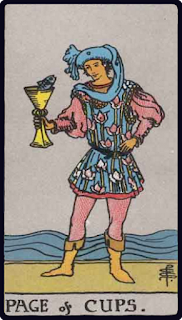
Representing study; the Page of Cups is associated with our reflection and admiration of the emotional connections we form with others. The Page of Cups is a sign that something can be learned from every experience and a prompt to regard our past relationships to determine how they came to be and what we can learn about them and ourselves in the process of understanding.
In the upright state the Page of Cups calls upon us to look back not in anger, but to consider all relationships we have had as serving a purpose; even those which may have ended in conflict can teach us something about ourselves or about others, or how we interact with others.
In the inverted state the Page of Cups represents the missing element; when we regard our past relationships in the pursuit of learning we should ask what was missing. In an effort to understand why a relationship worked or did not, it may not be that we find the answer in what happened, but rather in what did not.
In the Rider-Waite deck the Page of Cups depicts a man standing upon the shore with a body of water behind him. In his hand he holds a golden cup with a fish contained within it. The man regards the fish with curiosity, he is adorned in a blue and pink robe representing the balance of masculine and feminine traits. This robe is further emblazoned with waterlilies reinforcing the element of connection and affinity with the fish he holds in his hand.
In self-reflection the Page of Cups serves as a prompt to consider the skills and abilities that have been learned and identify the areas of shortfall; this is an opportunity to plan for future growth outside of this relationship. Relationships are not static; we grow as people and in time people can grow apart. It’s important to recognise growth in yourself and growth in your partner and reconcile any distance that may arise as a result.
Ask yourself “What has kept our relationship strong?” and “What has weakened our relationship?” even where relationships are maintained without coming to an end, they still serve as a training ground for how we interact with others outside of that relationship and how we interact with ourselves. Whilst it can be unhealthy to develop co-dependency, for some individuals the act of self-love can’t be achieved until they experience the love of another and come to think of themselves as worthy of love.
Where this relates specifically to your emotions and feelings the focus instead turns simply to expressing your emotional state in a constructive way. Ask yourself “Do I know how to express my emotions and show how I am feeling?” draw on the experience of your relationship and the modes of communication that you have developed.

No comments:
Post a Comment
All comments are moderated before they are published. If you want your comment to remain private please state that clearly.